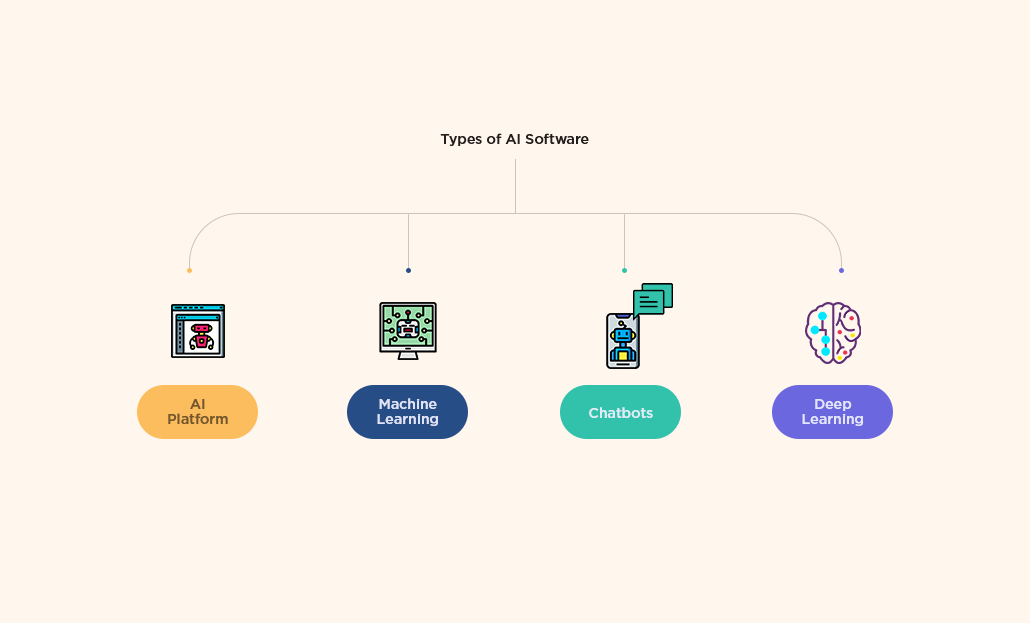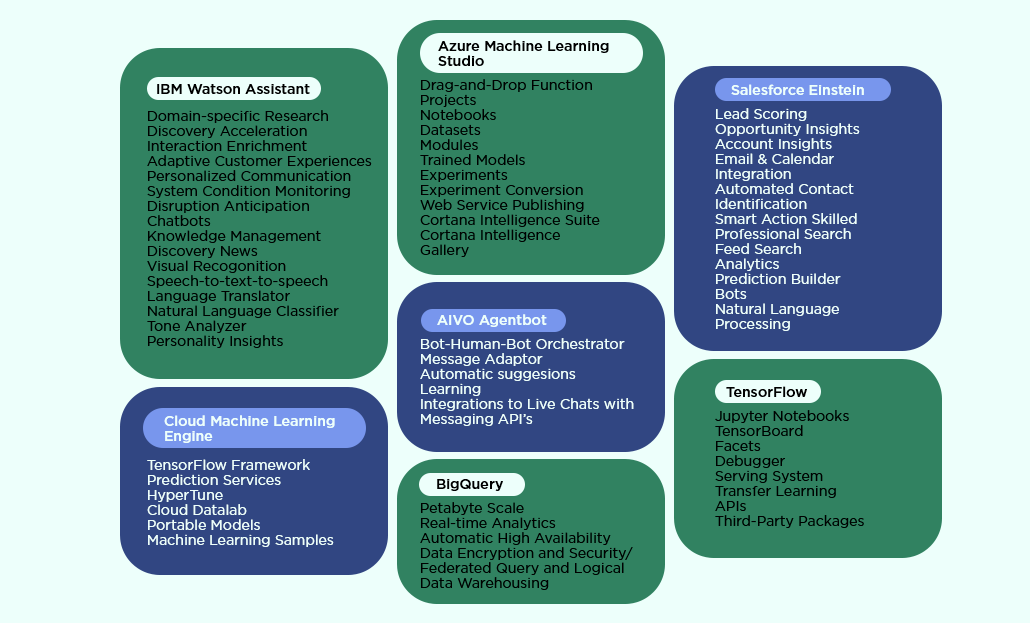AI (Artificial Intelligence) is a growing force in today’s industry. With the functionality to rapidly analyze the abundant amount of data, enterprises can now enhance customer interactions as well as drive workflow-process proficiencies. From voice-enabled assistants and facial recognition to virtual reality and proactive listening, the AI sector is booming rapidly. Virtual assistants and chatbots become vital parts of new products. Adding to this, robots are gaining more attention at conferences as well as showing power in their roles in diverse industries like healthcare, retail, manufacturing, and supply chain. Meanwhile, leading companies like Microsoft, Google, and Salesforces integrated AI as an intelligent automation into their entire tech pack.
Undoubtedly, artificial intelligence having its moment since enterprises have started to employ AI software for everything from handling social data to enhancing engagement in customer relationships. This blog presents some prominent functionalities of the artificial intelligence software to address each specific need of the business and ensure its success:
Learn more about the Artificial Intelligence in Business
Artificial Intelligence Software
AI is being widely used in business tools to build smart applications. These platforms include natural language processing, deep learning, cognitive computing, and machine learning (ML) to address the certain needs of the business. Artificial intelligence software can be termed as the software skilled in intelligent behavior. This software works by simulating a number of abilities like learning, reasoning, perception, problem-solving, and knowledge representation.
At present, the artificial intelligence software involves actively in applications like smartphone assistant, question-answer reality, voice & image recognition software, and ATM that read cheques. AI software provides developers with software to build intelligent apps either by adding speech recognition or machine learning to a solution or building an entirely new app from scratch using an AI platform. The AI tools are often libraries, algorithms of codes, or developer tools that can aid the user to employ deep learning and machine learning functionalities for applications.
Types of Artificial Intelligence Software
Artificial Intelligence software is a general space with a variety of subcategories. They are as follows:

- AI Platform
This is an ideal platform for businesses trying to create their own intelligent apps on top of their existing platform. Similar to the existing platform, these AI platform tools provide a drag & drop feature with prebuild code and algorithm framework that assists to build an app from scratch.
- Chatbots
The more refined area of AI software is Chatbots as it includes extremely specific resolutions in the business world that is automation and customer experience. This platform employs Natural Language Processing (NLP) to communicate with the customer through text or voice conversations.
- Machine Learning
The machine learning software includes a comprehensive range of frameworks and libraries that can achieve a variety of machine learning jobs when implemented correctly. This software allows apps to take decisions as well as predictions based on data.
- Deep Learning
Deep learning is something different from machine learning algorithms as it employs artificial neural networks to create their decisions and predictions. Also, Deep learning includes some further subcategories like natural language processing, image recognition, and speech recognition. Each of these subcategories provides users with a wide range of predominantly valuable functionalities to ensure business success.
Role of NLP in Artificial Intelligence
We can say natural language processing as a subset of artificial intelligence. Without NLP, AI merely can understand the languages and provide answers to simple questions. NLP empowers the AI software to understand the real meaning of words. Its core objective is to make computers or machines as intelligent as possible to understand the human language. The NLP applications enable users to interact with a system in their own natural language. The real-time applications of NLP in artificial intelligence software include question answering, sentiment analysis, text classification, automatic summarization, information extraction, and much more.
Characteristics of AI Software
- Data Ingestion – AI solution deals with a huge volume of records, which comes in at a greater velocity.
- Adaptive – AI tools employ machine learning to adjust to their environment. Moreover, they can learn from the outcomes to enhance their performance.
- Reactive – AI software typically react to the changing circumstances around them. Additionally, they track their inputs and raise procedures, rules as well as behaviors to calculate scores and make decisions.
- Concurrent – AI tools possess the capability to handle multiple system interactions simultaneously.
- Forward-looking – In addition to reacting to a situation, AI solutions also search through some feasible situations to discover an effective goal.
Standard Features of AI Software
While each AI tool offers a broad range of new features for businesses, almost all AI software includes some standard characteristics, as listed below:
- Natural Language Dialogue – The extended communication between two or more members in a natural language is called as natural language dialogue. Some conversational AI tools include language-processing techniques. In addition to being an efficient conversion partner, this feature allows the user to engage data and discover new associations and insights.
- Smart Data Discovery - AI tools come with conversational interactions, automated visions and a complete view of data discovery solutions. This feature supports to attain a deep understanding of the data - makes it easy to analyze.
- Self-service Dashboards- Another important and common feature to find in the most AI software is self-service dashboards. This feature supports the businesses to share their insights in the dashboard that can effortlessly create with the help of inbuilt visualization techniques.
- Text to Speech &Speech to Text - AI solutions are extended with the functionality to convert text into audio - in a wide variety of voices and languages. Similarly, they include features to extract text from voice or audio for fast understanding.
- Visual Recognition - This feature of AI software allows users to analyze the visual content of their videos and images with the help of machine learning.
- Automation - It is one of the most touted features in the AI and machine learning tools. These tools are capable to automate the manual processes using visual modeling practice without demanding human skills.
- Bot Design & Deployment - Businesses use bots to interact with the customer and ensure their 24 X 7 availability. Most of the AI solutions include an option to design and deploy the bots.
- Predictive Capabilities – A large number of AI tools come with predictive capabilities that support users to make a forecast on everything ranges from buying decisions to which treatment will be effective for a patient.
Features of leading Artificial intelligence software
The following table presents the list of features that leading AI software vendors offer:

Attractive Features of AI software
In addition to the above-mentioned standard functionalities, it is worth to have a look at some attractive features in leading AI software.
- Anomaly Detection and Predictive Maintenance
It is a notable feature from Microsoft Azure AI platform. The primary goal of this feature is to extend the service life of the device and prevent failures. With the anomaly detection characteristic, the tool alerts the user when equipment behaves erratically than expected. As this solution is more accurate than simple rule-based traditional failure detection methods, it prevents the expensive outages and failures.
- Entity Extraction with Text Analytics
A feature from Azure AI, that enables the tool to pull searchable named entities from text using machine learning algorithm as well as natural language processing. In most cases, this technique is used to answer several real-world questions like whether an enterprise is mentioned in a news article or whether a tweet comprises the name and location of a person.
- Defect Detection Using Image Analysis
Image classification is one of the most popular areas of AI. AI-driven image classification in the Microsoft Azure AI platform reduces manual effort and automatically categorizes images as accepted or rejected. It enhances the efficiency of the validation process as well as the quality of the entire manufacturing process.
- Einstein Vision for Social
With Salesforces Einstein’s image classification feature, users can recognize logos, food, objects, and scenes in social media in order to find new visions regarding their brands like where particular products are being employed even if the name is unmentioned.
- HyperTune
HyperTune from IBM Watson enables the user to provide significant results more rapidly since it automatically tunes deep learning hyper-parameters. With this feature, data scientists can handle a multitude of tuning experiments in a cloud environment. This capability saves several hours of boring and error-prone work.
- Trade-off
This IBM Watson feature supports businesses to take decisions just by balancing various objectives. With the support of trade-off analytics features, users can avoid unwanted options and find the right one from various objectives.
- Prediction of The Next Question
Aivo’s Agentbot have the option to suggest related content when it doesn’t have the information requested depending on the similar interaction of other clients.
Overall, AI software is undoubtedly a very powerful tool for the building of experiences, never made-up before. We do hope that AI apps entering our lives will remain serving the people in a beneficial way.






